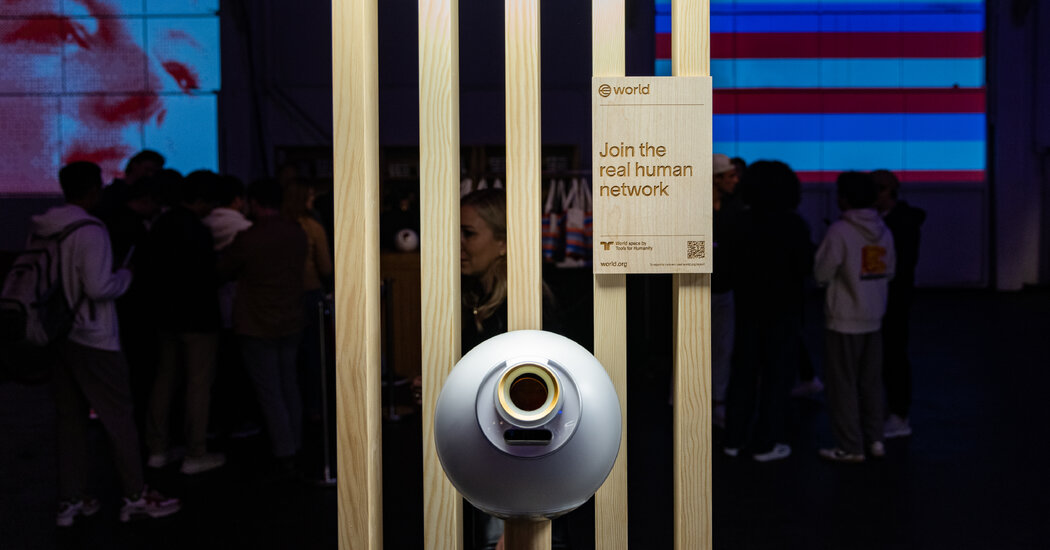World ID: A Biometric Solution for a Future Overrun by AI
A Glimpse into the Future
In San Francisco, where technological innovations abound, the ordinary becomes extraordinary. Here, one can find self-driving cars, ambitious start-ups, and revolutionary projects that seem to blur the lines of reality.
One such project, World, co-founded by Sam Altman of OpenAI, has garnered significant attention with its unique approach to safeguarding human interaction in an increasingly AI-driven digital landscape.
The Concept Behind World ID
World’s core proposition addresses the anticipated rise of AI bots making it challenging to distinguish between human interactions across various online platforms like social media, gaming, and dating sites.
To counter this issue, World introduces the World ID, likening it to expedited security measures like TSA PreCheck for the digital realm. The enrollment process requires users to undergo an iris scan using a device known as the Orb, after which they receive a unique biometric identifier stored on their smartphones. The company emphasizes that it retains only a numerical representation of the scanned data, ensuring user privacy.
In return for their participation, users are rewarded with a cryptocurrency called Worldcoin, which can be spent, traded, or sent to other holders.
Addressing the Trust Factor
At a recent event, Altman articulated the necessity of trust in what he called the “age of AGI” (Artificial General Intelligence). He highlighted the urgency for a reliable method to differentiate between bots and humans.
“We wanted a way to make sure that humans stay special and central in a world where the internet was going to have lots of AI-driven content,” Altman explained.
The vision for Worldcoin extends towards potentially establishing a universal basic income, enabling verified humans to transact with each other without traditional identifiers.
Global Expansion and Challenges
Since its international launch two years ago, World has found considerable traction in regions like Kenya and Indonesia, where users have eagerly lined up for Orb scans in exchange for crypto rewards. To date, the initiative has successfully enrolled around 26 million users, with over 12 million completing their Orb scans.
Despite notable growth, the project has faced scrutiny over biometric data collection, prompting regulatory investigations in locations such as Hong Kong and Spain.
Entering the U.S. Market
Recently, World has announced its entry into the U.S. market, setting up retail locations in cities like San Francisco and Los Angeles, with plans to have 7,500 Orbs available nationwide by year-end. The company also unveiled a new device, the Orb Mini, designed for ease of use while retaining the necessary functionality.
Collaborations with major brands, such as Razer and Match Group, further expand World’s reach, particularly in verifying human users on platforms like Tinder in Japan.
Public Reception and Skepticism
While the concept may appeal in certain markets, concerns regarding privacy and data security remain prevalent in developed countries. Attendees at World’s launch event voiced mixed feelings about the Biometric registry, with some users hesitating to share their personal data.
“I don’t give up my personal data easily, and I consider my eyeballs personal data,” remarked one attendee.
Critics also note that Altman’s leadership in OpenAI may raise questions about the feasibility of World ID, given the very AI dynamics it aims to address.
Conclusion: Balancing Innovation and Privacy
As the world adjusts to the proliferation of AI, the idea of biometric identification might initially seem unsettling. However, societal attitudes towards personal data are continually evolving. Drawing parallels to other biometric systems, the acceptance of World ID and its technology may hinge on user experiences and broader societal shifts.
Ultimately, navigating the balance between innovation and privacy will be crucial as we embrace new tools like World ID in our increasingly digital lives.


